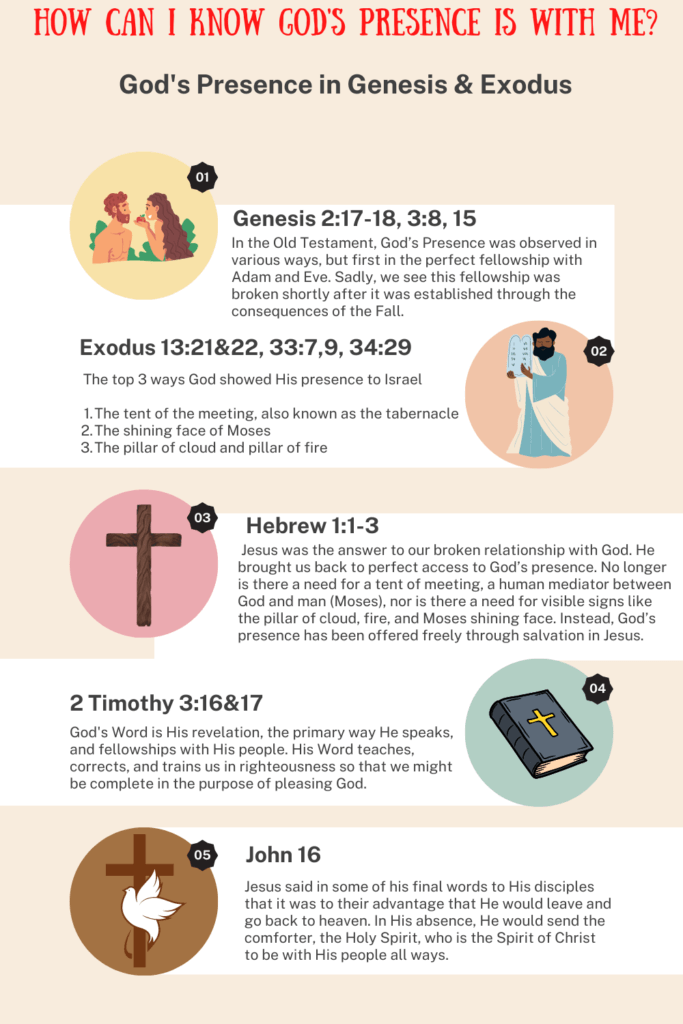How to Feel God’s Presence: Part 3
At the beginning of this series, we focused a lot of attention on how Moses was the mediator for the people of Israel. We then moved to part 2 to focus on Jesus, God’s perfect mediator and the one who opened the door through means of His flesh to God’s presence. Finally, with Jesus in view, we move to the third part of this series to discuss how believers today can see and feel God’s presence in their everyday lives.
God’s Presence in His Word

The first way we can have confidence that God is present is through His Word.
2 Timothy 3:16&17
6 All Scripture is breathed out by God and profitable for teaching, for reproof, for correction, and for training in righteousness, 17 that the man of God may be complete, equipped for every good work.
As some translations say, the phrase breathed out or inspired by God means that Scripture is directly from God 2 Peter 1:19–21. So, why is this significant to our topic of God’s presence? When we look at the entirety of Scripture, from God’s promise to Adam and Eve to send the Messiah would be the sinless sacrifice for sin to Jesus’s departure from the earth into the clouds with the assurance that He would also be with us always Matthew 28:20b, we see God’s presence first promised than accomplished, and now everlasting.
God’s Word reveals how His presence can dwell with man. Therefore, as I also mentioned in the second part of this series, it was to our advantage that Jesus left this earth so that man’s ability to dwell in the presence of God would be complete.
God has given us His Word as a means of direct access to Him. So the question now stands: Why do we not choose to dwell in His presence? We could say a lot about that; however, let’s look back to the Israelites’ experience in Exodus 32, where we see one of man’s greatest reasons to miss God’s presence.
Exodus 32:1
When the people saw that Moses delayed coming down from the mountain, they gathered themselves together to Aaron and said to him, “Up, make us gods who shall go before us. As for this Moses, the man who brought us up out of the land of Egypt, we do not know what has become of him.”
Moses’ delay caused the people to become impatient. They wanted their needs to be met at the demand of their desires (see Exodus 16:2 and 3, Exodus 17:1–4, and 15:1 and 2). The heart of their problem was discontentment and distrust in God’s goodness to them. Doesn’t this sound somewhat familiar?
Genesis 3:1–6
He said to the woman, “Did God actually say, ‘You shall not eat of any tree in the garden’?” 2 And the woman said to the serpent, “We may eat of the fruit of the trees in the garden, 3 but God said, ‘You shall not eat of the fruit of the tree that is in the midst of the garden, neither shall you touch it, lest you die.’” 4 But the serpent said to the woman, “You will not surely die. 5 For God knows that when you eat of it, your eyes will be opened, and you will be like God, knowing good and evil.” 6 So when the woman saw that the tree was good for food, and that it was a delight to the eyes, and that the tree was to be desired to make one wise, she took of its fruit and ate, and she also gave some to her husband who was with her, and he ate.
In the same way, Eve allowed her desires to dictate her trust in God, and her actions plunged humanity into sin. As finite creatures, we are bent toward the desire to distrust God, but in His mercy, God has offered an answer for man’s wandering heart.
Jesus said,
John 16:7
7 Nevertheless, I tell you the truth: it is to your advantage that I go away, for if I do not go away, the Helper will not come to you. But if I go, I will send him to you.
Have trouble finding your way around the Bible? Join me for a 90-minute coaching session, during which I will walk you through four important steps to Bible Study. The workbook and Study notes are included. Click the image below to get started.
God’s Presence in the Holy Spirit
The second way we can feel and experience God’s presence is through the Holy Spirit, who dwells within the believer.
John 14:16–20
16 And I will ask the Father, and he will give you another Helper, to be with you forever, 17 even the Spirit of truth, whom the world cannot receive, because it neither sees him nor knows him. You know him, for he dwells with you and will be in you. 18 “I will not leave you as orphans; I will come to you. 19 Yet a little while and the world will see me no more, but you will see me. Because I live, you also will live. 20 In that day you will know that I am in my Father, and you in me, and I in you.
The Seal of Our Salvation
Jesus’ explanation in John 14:16–20 was that when He leaves this earth, the Holy Spirit will indwell those who believe in Him. This fact is of major importance when considering the presence of God because it reminds us that we are never alone. At the moment of our salvation, we are sealed with the Holy Spirit; He is our guarantee that we are never alone.
Ephesians 1:13&14
13 In him you also, when you heard the word of truth, the gospel of your salvation, and believed in him, were sealed with the promised Holy Spirit, 14 who is the guarantee of our inheritance until we acquire possession of it, to the praise of his glory.
In moments of doubt, this is the first promise we are to trust (see Psalm 16:11).
Connection with the Father and Son
Secondly, and in keeping with this theme, the Holy Spirit is how we are connected to God the Father and the Son (See 1 John 3:24, John 16:13–15, Psalm 139:7).
In John 17, famously known as the High Priestly prayer of Jesus, we witness Him asking the Father to keep His people the Father had given Him. The sealing of the Holy Spirit is also what theologians call the perseverance of the saints. This means that no matter what happens, we can never lose our salvation (or the presence of God) once we have been sealed Romans 8:31–39.
Our guide to all Truth
The third reason we can trust God’s presence with us is through conviction and guidance of the Holy Spirit.
John 16:7–11, 13–4
7 Nevertheless, I tell you the truth: it is to your advantage that I go away, for if I do not go away, the Helper will not come to you. But if I go, I will send him to you. 8 And when he comes, he will convict the world concerning sin and righteousness and judgment: 9 concerning sin, because they do not believe in me; 10 concerning righteousness, because I go to the Father, and you will see me no longer; 11 concerning judgment, because the ruler of this world is judged. 13 When the Spirit of truth comes, he will guide you into all the truth, for he will not speak on his own authority, but whatever he hears he will speak, and he will declare to you the things that are to come. 14 He will glorify me, for he will take what is mine and declare it to you.
The Holy Spirit helps us carry out the goal of the Christian life, for through Him we are conformed into the image of Christ Romans 8:29. The more we seek to know God and are transformed by the renewing of our minds Romans 12:2 the closer we will feel to Him because we will be like Him 1 John 3:2.
God has given us His written Word and His Spirit to guide us, yet we are often not satisfied. We fight the battle of discontentment daily and must strive to win it.
In closing, let me leave you with a thought to consider. If you were to meet someone new at church and the only time you ever spent with them was in a large group gathering, how well would you know them personally? Would you feel close to them?
The answer is no. We cannot expect to be close to God if we are never in His presence. Having regular, committed time with God is the first step to feeling His presence. In this series’s next and final part, I offer you some practice steps toward developing a close relationship with God.




